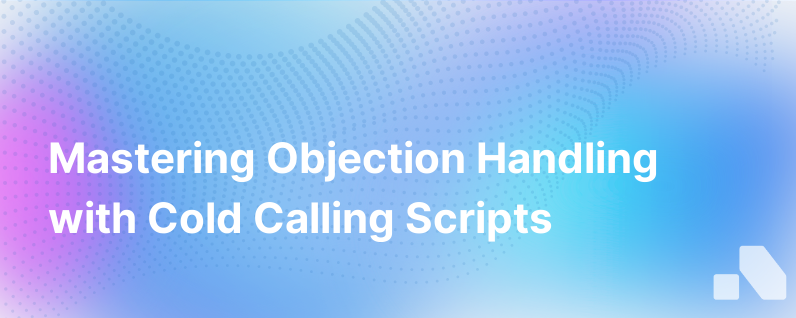
"Cold calling remains a cornerstone of sales strategies across many industries, but it never comes without challenge. One of the most common obstacles sales representatives encounter is handling objections. Whether it's a matter of bad timing or lack of interest, responses such as 'I'm not interested,' 'We're happy with our current solution,' or 'Call me back later,' are frequent and can derail a call quickly if not navigated wisely.
However, with carefully crafted scripts that anticipate and address these common objections, sales professionals can keep conversations on track and move even the most resistant prospects through the sales pipeline.
Anatomy of an Effective Objection-Handling Script
An excellent objection-handling script is empathetic yet assertive. It acknowledges the prospect's concerns and seamlessly transitions into why your product or service is still worth considering. Here are some essential components that you should include:
- Acknowledge: Recognize the prospect's objection without immediately dismissing it.
- Clarify: Seek to understand the objection better. Often, objections stem from misunderstandings or lack of information.
- Respond: Offer information or insights to address the objection logically and convincingly.
- Check: Verify that the prospect's concern has been satisfied before moving forward.
Script Examples for Common Cold Call Objections
Let's explore a couple of scripted responses to common objections to illustrate how to handle them effectively during a cold call.
Objection 1: "I'm not interested."
Acknowledge: "I understand that you might not be looking for new solutions right now..." Clarify: "...but may I ask what's currently on your priority list that's keeping you from considering alternatives?" Respond: "Sometimes our clients find that while they weren't actively looking, our product was able to save them time and increase revenue in areas they hadn't considered. I'd gladly share how." Check: "Would it be helpful if I sent over a case study highlighting these benefits at a time that suits you?"
Objection 2: "We're happy with our current solution."
Acknowledge: "That’s great to hear that you’re achieving good results with your current system..." Clarify: "... but I'm curious, are there any features or outcomes you wish you could improve upon?" Respond: "Our solution is designed to complement existing systems by offering [specific feature] which has helped businesses like yours achieve [specific result]." Check: "If I could show you how we've helped others improve, would you be open to a brief discussion?"
Objection 3: "Call me back later."
Acknowledge: "Absolutely, I want to respect your time..." Clarify: "... could I ask when would be a better time frame for you?" Respond: "I can schedule a call for that time, or alternatively, I can send you some brief info by email. Which would you prefer?" Check: "I've set a reminder for our call. Meanwhile, I'll forward some key information that will make our discussion more productive."
Objection 4: "We don't have the budget for this."
Acknowledge: "I understand that budgeting is a significant concern, especially in the current climate." Clarify: "May I ask when your next budget review is due or if there are provisions for essential investments?" Respond: "Our solutions are scalable and provide a significant return on investment, often paying for themselves within months." Check: "How about we look at some numbers together to see if we can make it workable within your budget?"
Objection 5: "I'm not the decision-maker."
Acknowledge: "That’s quite all right, being in the loop is important..." Clarify: "... could you direct me to the person responsible for making these decisions?" Respond: "I would appreciate the opportunity to briefly discuss how our solutions might benefit your team with them." Check: "Can I leave my contact details with you, or would it be possible for you to introduce me via email?"
These scripts serve as the foundation for effective objection handling. However, they are not a one-size-fits-all solution. Each sales rep must tailor their approach to the prospect's specific situation, while maintaining a natural conversational flow.
Objection Handling Best Practices
Here are a few best practices that should be kept in mind when implementing these scripts:
- Stay calm: Objections are a natural part of the sales process. Don't get flustered.
- Listen actively: Sometimes the objection isn’t the real issue. Listening can reveal underlying concerns.
- Keep it conversational: Scripts should be a guide rather than a rigid playbook. Adapt to the flow of conversation.
- Practice: Rehearse various scenarios with your team to become comfortable with different objections.
- Be patient: Building rapport and trust often mitigates objections and can take multiple interactions.
In conclusion, mastering the art of objection handling is a critical skill for any sales team, and well-crafted cold calling scripts are indispensable tools in this pursuit. Each objection is an opportunity to deepen understanding and demonstrate value, paving the way for a productive relationship.
By incorporating the strategies and scripts from this guide into your sales process, you’ll be well-equipped to turn objections into opportunities and rejections into conversions, ultimately driving the success of your campaigns.
Remember, sales is often a numbers game, but by deploying strategic scripts and objection handling techniques, you can significantly improve your chances of success.
The ingenuity and versatility found within a well-crafted cold call script may be the difference between a lost sale and a loyal customer. So take the time to refine your approach, train your team, and watch your sales figures climb.
Note: While this guide provides general advice on objection handling, each sales conversation is unique and requires a tailored approach. Furthermore, tools like Aomni offer AI-driven insights into B2B sales strategies, providing real-time account research and personalized content to support the sales process."